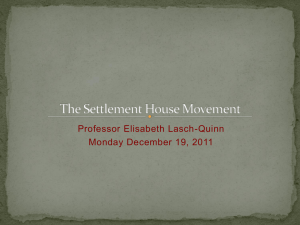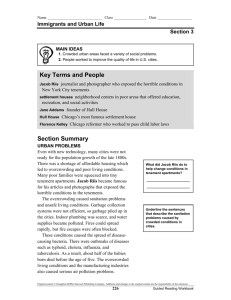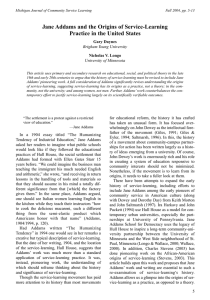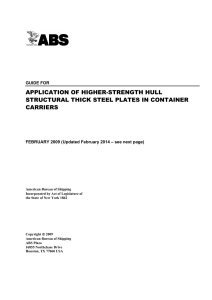8_Primary Source.doc
advertisement
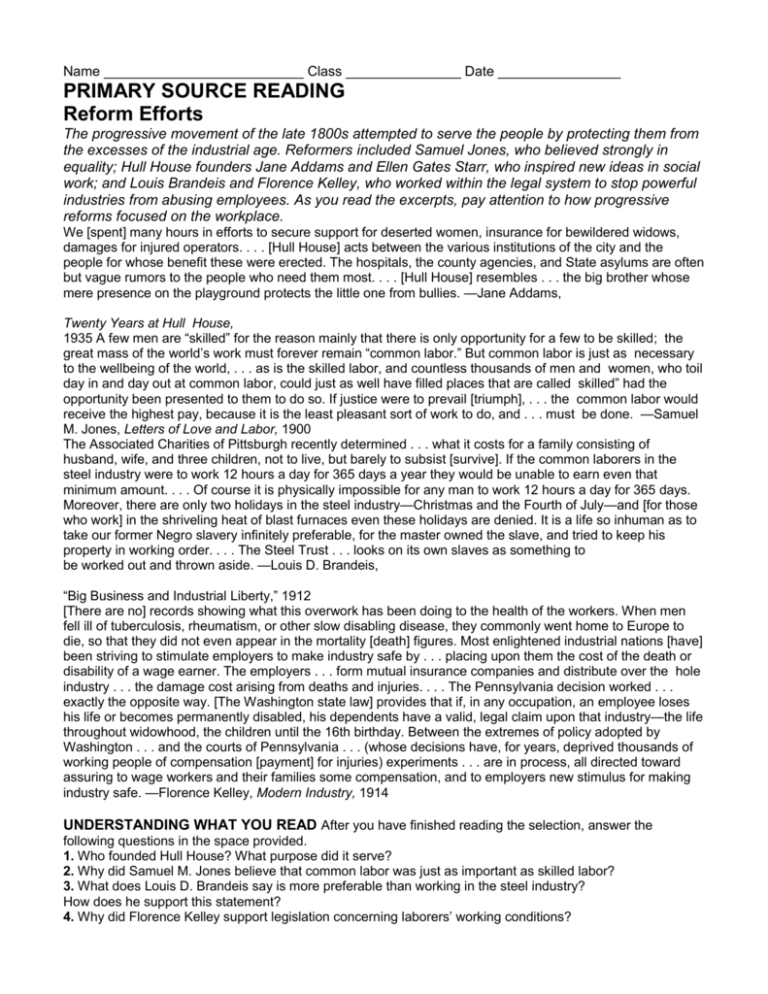
Name __________________________ Class _______________ Date ________________ PRIMARY SOURCE READING Reform Efforts The progressive movement of the late 1800s attempted to serve the people by protecting them from the excesses of the industrial age. Reformers included Samuel Jones, who believed strongly in equality; Hull House founders Jane Addams and Ellen Gates Starr, who inspired new ideas in social work; and Louis Brandeis and Florence Kelley, who worked within the legal system to stop powerful industries from abusing employees. As you read the excerpts, pay attention to how progressive reforms focused on the workplace. We [spent] many hours in efforts to secure support for deserted women, insurance for bewildered widows, damages for injured operators. . . . [Hull House] acts between the various institutions of the city and the people for whose benefit these were erected. The hospitals, the county agencies, and State asylums are often but vague rumors to the people who need them most. . . . [Hull House] resembles . . . the big brother whose mere presence on the playground protects the little one from bullies. —Jane Addams, Twenty Years at Hull House, 1935 A few men are “skilled” for the reason mainly that there is only opportunity for a few to be skilled; the great mass of the world’s work must forever remain “common labor.” But common labor is just as necessary to the wellbeing of the world, . . . as is the skilled labor, and countless thousands of men and women, who toil day in and day out at common labor, could just as well have filled places that are called skilled” had the opportunity been presented to them to do so. If justice were to prevail [triumph], . . . the common labor would receive the highest pay, because it is the least pleasant sort of work to do, and . . . must be done. —Samuel M. Jones, Letters of Love and Labor, 1900 The Associated Charities of Pittsburgh recently determined . . . what it costs for a family consisting of husband, wife, and three children, not to live, but barely to subsist [survive]. If the common laborers in the steel industry were to work 12 hours a day for 365 days a year they would be unable to earn even that minimum amount. . . . Of course it is physically impossible for any man to work 12 hours a day for 365 days. Moreover, there are only two holidays in the steel industry—Christmas and the Fourth of July—and [for those who work] in the shriveling heat of blast furnaces even these holidays are denied. It is a life so inhuman as to take our former Negro slavery infinitely preferable, for the master owned the slave, and tried to keep his property in working order. . . . The Steel Trust . . . looks on its own slaves as something to be worked out and thrown aside. —Louis D. Brandeis, “Big Business and Industrial Liberty,” 1912 [There are no] records showing what this overwork has been doing to the health of the workers. When men fell ill of tuberculosis, rheumatism, or other slow disabling disease, they commonly went home to Europe to die, so that they did not even appear in the mortality [death] figures. Most enlightened industrial nations [have] been striving to stimulate employers to make industry safe by . . . placing upon them the cost of the death or disability of a wage earner. The employers . . . form mutual insurance companies and distribute over the hole industry . . . the damage cost arising from deaths and injuries. . . . The Pennsylvania decision worked . . . exactly the opposite way. [The Washington state law] provides that if, in any occupation, an employee loses his life or becomes permanently disabled, his dependents have a valid, legal claim upon that industry—the life throughout widowhood, the children until the 16th birthday. Between the extremes of policy adopted by Washington . . . and the courts of Pennsylvania . . . (whose decisions have, for years, deprived thousands of working people of compensation [payment] for injuries) experiments . . . are in process, all directed toward assuring to wage workers and their families some compensation, and to employers new stimulus for making industry safe. —Florence Kelley, Modern Industry, 1914 UNDERSTANDING WHAT YOU READ After you have finished reading the selection, answer the following questions in the space provided. 1. Who founded Hull House? What purpose did it serve? 2. Why did Samuel M. Jones believe that common labor was just as important as skilled labor? 3. What does Louis D. Brandeis say is more preferable than working in the steel industry? How does he support this statement? 4. Why did Florence Kelley support legislation concerning laborers’ working conditions? What did she say the legislation should provide to workers? 5. What are some ways that the progressive movement helped to shape the modern work environment? Answer Key _ Readings 193 Chapter 8 PRIMARY SOURCE 1. Jane Addams and Ellen Gates Starr; served as a community center to provide services such as securing support for deserted women, insurance for widows, and damages for injured workers 2. Common labor was the least pleasant sort of work to do but work that must be done. 3. slavery; says that at least slave owners tried to keep their property in working order, whereas the steel business believed workers were expendable 4. because workers were physically overworked and often became ill or disabled from poor working conditions; protection to an employee who was disabled on the job and should provide compensation to the family of a worker who was killed on the job 5. Students might suggest that many laws are in place today that protect workers from being overworked and to insure they receive a minimum wage.

